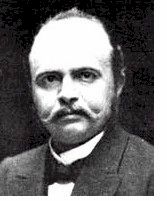Hans Driesch
| Hans Adolf Eduard Driesch | |
|---|---|
 |
|
| Born | 28 October 1867 Bad Kreuznach |
| Died | 17 April 1941 (aged 73) Leipzig |
| Citizenship | German |
| Fields | Biology and philosophy |
| Known for |
Developmental biology Neo-vitalist philosophy of entelechy Lebensphilosophie |
Hans Adolf Eduard Driesch (28 October 1867 – 17 April 1941) was a German biologist and philosopher from Bad Kreuznach. He is most noted for his early experimental work in embryology and for his neo-vitalist philosophy of entelechy. He is also credited with performing the first 'cloning' of an animal in the 1880s.
Driesch was educated at the Gelehrtenschule des Johanneums. He began to study medicine in 1886 under August Weismann at the University of Freiburg. In 1887 he attended the University of Jena under Ernst Haeckel, Oscar Hertwig and Christian Ernst Stahl. In 1888 he studied physics and chemistry at the University of Munich. He received his doctorate in 1889. He travelled widely on field and study trips and lecture-tours, visiting Plymouth, India, Zurich and Leipzig where, in 1894, he published his Analytische Theorie der organischen Entwicklung or Analytic Theory of Organic Development. His interests encompassed mathematics, philosophy and physics as well as biology. He married Margarete Relfferschneidt, and the couple had two children.
From 1891 Driesch worked in Naples at the Marine Biological Station, where until 1901 he continued to experiment and seek a theoretical formulation of his results. He enquired into classical and modern philosophy in his search for an adequate theoretical overview and ended by adopting an Aristotlean teleological theory of entelechy.
Under the influence of his teacher Haeckel, Driesch had tested the mechanistic embryological theories of another of Haeckel's students, Wilhelm Roux. By 1885 Driesch's experiments on the sea urchin embryo suggested that it was possible to remove large pieces from eggs, shuffle the blastomeres and interfere in many ways without affecting the resulting embryo. It appeared that any single monad in the original egg cell was capable of forming any part of the completed embryo. This important refutation of both preformation and the mosaic theory of Wilhelm Roux was to be subject to much discussion in the ensuing years, and caused friction among Driesch, Roux and Haeckel.
...
Wikipedia
